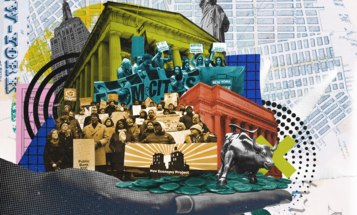
Right Now: Big Banks Are Gutting Dodd-Frank
One by one, the House Financial Services Committee has rubber-stamped industry approved bills that would weaken elements of Dodd-Frank designed to hem in risky derivatives trading.
There’s very few things that politicians in Washington can agree upon and one of them is systematically undermining Dodd-Frank. It doesn't hurt that there's big money behind it.
Ever heard of Jeb Hensarling? Of course not. He’s just the little-known congressman from Texas steadily working to get rid of Dodd-Frank’s most important restrictions. He also just so happens to be the fifth largest recipient of campaign cash from big banks. Through the House Financial Services Committee he’s chaired since January, Hensarling has passed a series of deregulatory bills under the guise of “improving” Dodd-Frank. In reality, his committee has become an industry-approved pipeline of dangerous legislation that would render Dodd-Frank toothless.
One by one, the House Financial Services Committee has rubber-stamped industry approved bills that would weaken elements of Dodd-Frank designed to hem in risky derivatives trading. Erika Eichelberger at Mother Jones provides a succinct summary of the bills.
One of the offending bills would allow certain derivatives that are traded within a corporation to be exempt from almost all new Dodd-Frank regulations. The second would expand the types of trading risks that banks can take on. The third would allow big US-based multinational banks to escape US regulations by operating through international subsidiaries. Financial reform advocates say it is way too early to start messing with Wall Street reform, especially since key parts of Dodd-Frank have yet to go into effect.
Eichelberger also notes that “House Financial Services Committee members received some $14.8 million in contributions from the financial services and banking sectors during the last election cycle.”
Last week, the New York Times Dealbook revealed that H.R. 992, which would exempt banks from a provision of Dodd-Frank that would force them to conduct derivatives trading under entities not backed by federal insurance, was written almost entirely by banking lobbyists.
70 of the 85 lines of the bill were written by Citibank, which is convenient, because 90% of derivatives are traded through big banks. The bill sailed through the House Financial Services Committee. Unsurprisingly, lawmakers received over twice as many donations from financial services lobbyists than from opponents, according to MapLight’s donation data.
One of their principal targets is the Commodity Futures Trading Commission (CFTC), the agency empowered by the Dodd-Frank act to regulate futures markets. Led by the aggressive Chairman Gary Gensler since 2009, the CFTC has become one of the most effective regulators. Wallace Turbeville previously profiled Gensler, calling him an unlikely progressive hero, proving cynics wrong and aggressively using the CFTC’s tools to regulate previously dark derivatives markets despite his nearly two decades at Goldman Sachs.
Today, the House Financial Services Committee passed H.R. 1256, the “Swaps Jurisdiction Certainty Act.” H.R. 1256 would exempt overseas derivatives trading from U.S. regulation unless the SEC and CFTC agree to it, undermining the CFTCs efforts to bring international trades in line with U.S. regulations. The problem is that half of all derivatives trading happens overseas, and the SEC has been consistently weak and ineffectual. Alexis Goldstein, an Occupy activist, aptly describes the bill as the “Intimidate a Financial Regulator Act.” Interest groups that support deregulation gave nearly sixty times in campaign contributions as opponents. Representative Scott Garrett, the bill's sponsor, received half a million dollars in campaign contributions from big banks.
The bill received bipartisan support from the House Financial Services Committee, with only six Democrats on the committee abstaining. It goes before the full House of Representatives today, inexplicably fast-tracked as part of a Department of Defense appropriations bill. Congress gets things done when there’s big money behind it.
The efficacy of corporate money and lobbyists in swaying lawmakers over appointed regulators like Gensler suggests the problem lies, at least in part, in our broken system of campaign finance. Over-leveraged banks hope you don’t notice the same parties making the same mistakes, depending on the dryness of the subject matter and the substantial amount spent on lobbying to deter public scrutiny, while the public, and advocates for reform, have little sway.
Strong derivatives rules make for a stable financial system. The CFTC’s efforts to enact meaningful reform of international swaps should be encouraged (preferably with more money). Until we start limiting the influence of corporate money in elections, it’ll be hard to do.
Find this all too dry? Occupy activist Alexis Goldstein illustrates it with pictures of cats.



